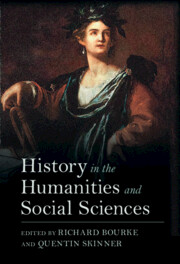Book contents
- History in the Humanities and Social Sciences
- History in the Humanities and Social Sciences
- Copyright page
- Contents
- Figures
- Contributors
- Acknowledgements
- Introduction
- 1 Law and History, History and Law
- 2 History, Law and the Rediscovery of Social Theory
- 3 The Uses of History in the Study of International Politics
- 4 International Relations Theory and Modern International Order: The Case of Refugees
- 5 The Delphi Syndrome: Using History in the Social Sciences
- 6 Power in Narrative and Narratives of Power in Historical Sociology
- 7 History and Normativity in Political Theory: The Case of Rawls
- 8 Political Philosophy and the Uses of History
- 9 The Relationship between Philosophy and its History
- 10 When Reason Does Not See You: Feminism at the Intersection of History and Philosophy
- 11 On (Lost and Found) Analytical History in Political Science
- 12 Making History: Poetry and Prosopopoeia
- 13 Reloading the British Romantic Canon: The Historical Editing of Literary Texts
- 14 Economics and History: Analysing Serfdom
- 15 The Return of Depression Economics: Paul Krugman and the Twenty-First-Century Crisis of American Democracy
- 16 Anthropology and the Turn to History
- Index
- References
2 - History, Law and the Rediscovery of Social Theory
Published online by Cambridge University Press: 08 December 2022
- History in the Humanities and Social Sciences
- History in the Humanities and Social Sciences
- Copyright page
- Contents
- Figures
- Contributors
- Acknowledgements
- Introduction
- 1 Law and History, History and Law
- 2 History, Law and the Rediscovery of Social Theory
- 3 The Uses of History in the Study of International Politics
- 4 International Relations Theory and Modern International Order: The Case of Refugees
- 5 The Delphi Syndrome: Using History in the Social Sciences
- 6 Power in Narrative and Narratives of Power in Historical Sociology
- 7 History and Normativity in Political Theory: The Case of Rawls
- 8 Political Philosophy and the Uses of History
- 9 The Relationship between Philosophy and its History
- 10 When Reason Does Not See You: Feminism at the Intersection of History and Philosophy
- 11 On (Lost and Found) Analytical History in Political Science
- 12 Making History: Poetry and Prosopopoeia
- 13 Reloading the British Romantic Canon: The Historical Editing of Literary Texts
- 14 Economics and History: Analysing Serfdom
- 15 The Return of Depression Economics: Paul Krugman and the Twenty-First-Century Crisis of American Democracy
- 16 Anthropology and the Turn to History
- Index
- References
Summary
This chapter argues for the need for both history and law to recommit to the broad tradition of social theory, in order for either to make progress on its own, let alone for one to plausibly reorient the other. From the perspective of this argument for common need rather than crossdisciplinary largesse, it is not going to be good enough to suppose that contemporary historiography is already well-positioned for relevance to other fields. In the last fifty years, it has lost touch with the tradition of social theory, thanks to the linguistic and cultural turns and a certain fetishization of contingent outcomes that have been emphasized in critical and genealogical sorts of history. The chapter proceeds to map three ongoing quandaries in social theory, since it is only within the discussion of each that the relationship of history to law takes on its significance. These are the 1) the dilemma of representations versus practices; 2) the reconciliation of contingency and determination; 3) and the assessment of the normative and the political, both as something to explain in diverse past settings but also what might motivate and orient present inquiry in the first place.
Keywords
- Type
- Chapter
- Information
- History in the Humanities and Social Sciences , pp. 49 - 68Publisher: Cambridge University PressPrint publication year: 2022

